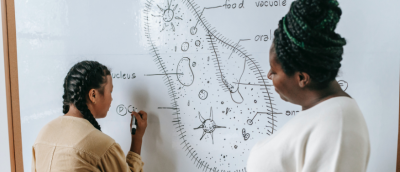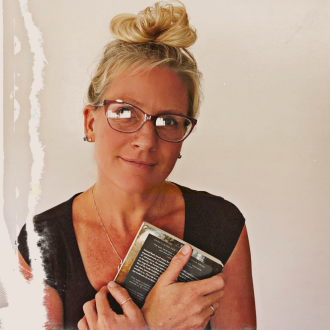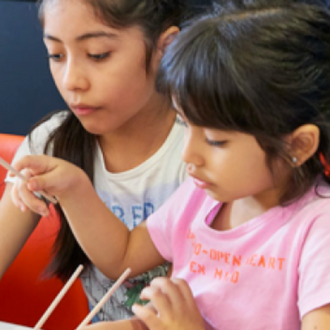Getting Sonoma Teens Into the “Mind of a Scientist”

Authored by Rosalie C. Abbott, Young Adult Services Librarian, Sonoma County Library
At Sonoma County Library’s Sebastopol Regional branch, we are constantly questioning how we might better develop programs and services to reflect and support our community. We strive to engage in courageous conversations, encourage questioning of the status quo, recommend expansive reading, promote self-education and work to dismantle systemic racism on all fronts. Several years ago we started a social justice book club and before the pandemic we hosted an inclusive weekly schedule of insightful guest speakers for our local high school Ethnic Studies class. We began a Girls Who Code club which is now in its fourth year and going strong even though the club is 100% virtual now due to the pandemic. Additionally, we were the first public library system in the nation to offer a menstrual equity program where we provide menstrual products in every restroom at all of our library branches across the county.
In September of 2020, we took on a creative challenge. We focused on innovating to offer a new STEM learning opportunity with a focus on teens, despite the new quandary of remote learning and Zoom fatigue. Our "Mind of a Scientist" offering does more than excite students about science and engineering. Our program also addresses race and social equity issues embedded within both science and our society.

Mind of a Scientist is an opportunity for high school students — and science lovers of all ages — to experience a day in the life of a scientist. Each week, we venture out to meet scientists and engineers presenting live from their labs or the field. During these virtual field trips, science and engineering experts share the adventures they experience in their various professions and answer student questions. Together with professional scientists and engineers, we host breakout groups where students use math and science to solve real world problems. These fun and interesting live Zoom presentations, complete with a question and answer opportunities, are recorded and later uploaded to the Mind of a Scientist Playlist on our library’s YouTube page. We also create bite-sized “MOAS Highlights,” as short as one minute, for those with a shorter attention span.
In one of our first episodes, Dr. Soto from Sonoma State University spoke about various social equity issues such as how minimizing carbon dioxide will reduce asthma next to highways which often is a social justice concern, or considering the agricultural industry and how we can take into account pollution and problems that affect farmworkers since these issues are deeply intertwined. Additionally, he pointed out disparities in how men in engineering are treated relative to the ways that women are treated. Dr. Soto noted that all of these issues are just as important as any other concern we might have in the scientific community. These issues and questions are topics that we have embedded in most of our programming, and we hope to expand this element dramatically as we delve into 2021.

Our primary goals are to inspire and spread the love and curiosity of science among teens near and far and highlight professionals who break the mold of what society generally depicts STEM professionals to look like. When people think of scientists or engineers, they might visualize images of professionals who are typically white and male. We are working to change these preconceived notions by introducing students to scientists and engineers who identify as female, non-binary and/or as people of color — professionals who have immigrated or break traditional stereotypes in any and every way. When teens and tweens meet someone who looks like them, a beautiful phenomenon happens — students realize that possibility can become a reality and they too can achieve success.
In this context, we help students learn about various scientific disciplines with lessons, interactive experiments and activities, and enable them to share hands-on/project-based educational experiences. We also highlight and offer insight into potential career opportunities that are open to students from various socioeconomic or cultural backgrounds. Offering opportunities and learning experiences that promote STEM equity is vital for teens and tweens in our current environment where schools and society are on a semi-permanent lockdown and the need to ignite curiosity about science, technology, engineering, art and math is real.

We offer opportunities for teens to connect and engage with the world of science so they may see how it is interwoven within the fabric of our everyday experiences, igniting the interest and imaginations of high school students. Benefits range from students learning at least one new concept to a student who is motivated to dedicate their life to working in a science-based career or supporting causes with a scientific foundation.
This program was originally dreamed up by enthusiastic high school teacher extraordinaire Milo Mitchel, who invited me to collaborate in making this program a reality. In the time of COVID-19, this has been exactly what we both needed professionally to stretch, grow and create meaningful learning experiences for teens. What’s next? We are planning to create a corresponding podcast in 2021. Stay tuned!

Rosalie C. Abbott
Young Adult Services Librarian, Sonoma County Library
Rosalie C. Abbott (she/her/hers/ella), together with her “dream team” colleagues at the Sebastopol Regional Library branch of the Sonoma County Library, has been striving to serve the people of Sonoma County since she joined the lineup as a young adult services librarian in the summer of 2017. Abbott is passionate about focusing on social and racial justice, inspiring girls and women to learn to code, offering opportunities for men and boys to sew, encouraging everyone to learn American Sign Language and of course listening to audiobooks.
Related Articles

Rethinking Chicago’s STEM Programming in the Age of COVID-19
Chicago Public Library
Learn how Chicago Public Library transitioned their youth STEM programming to virtual spaces once the pandemic hit.
